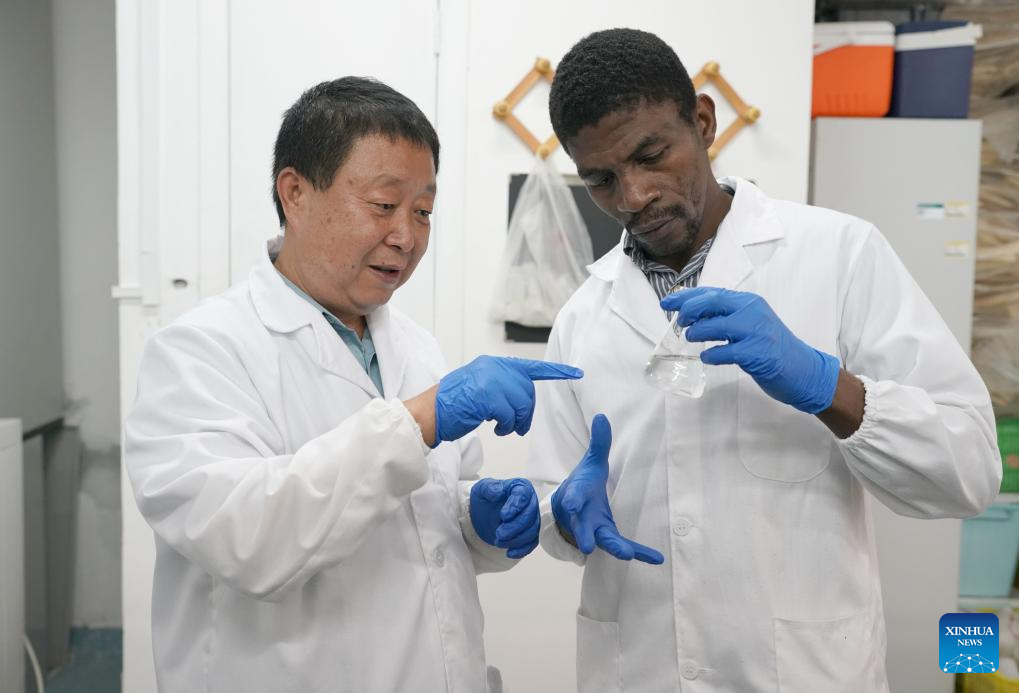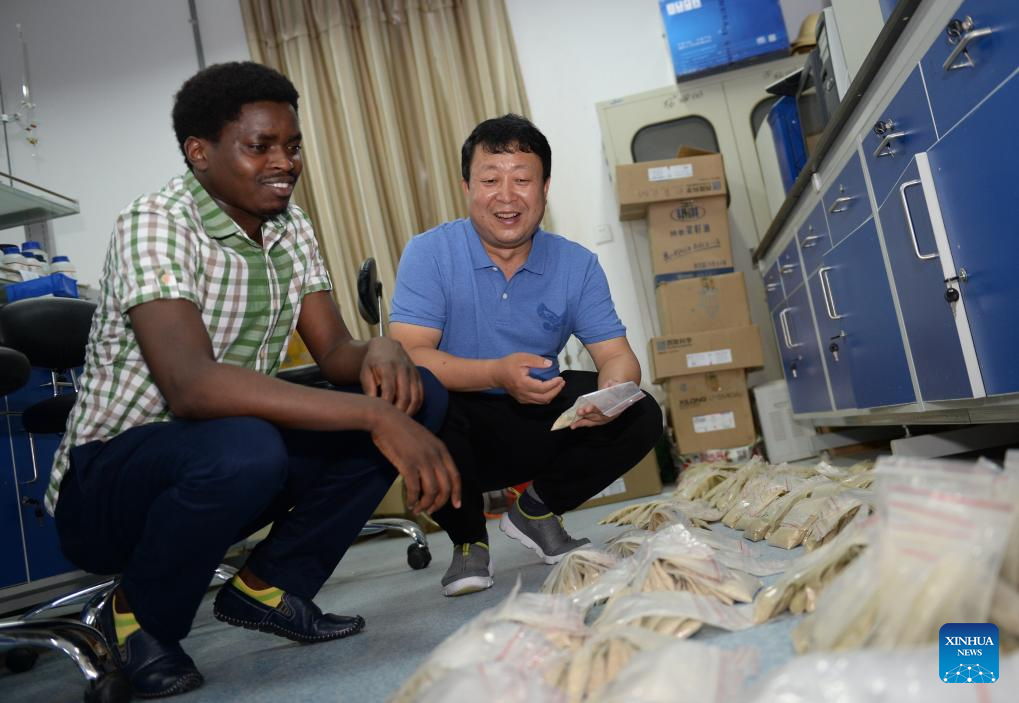Profile: Tilling land, touching hearts: Chinese agriculture professor’s dedication to Africa

Professor Hai Jiangbo’s Vision for Agricultural Development in Africa

Professor Hai Jiangbo talks with Ngnadong Wansim Aboubakar, a doctoral candidate from Cameroon, at the College of Agronomy, Northwest Agriculture and Forestry University in Yangling, northwest China’s Shaanxi Province, Sept. 3, 2024. (Xinhua/Shao Rui)
Introduction
XI’AN, Oct. 13 (Xinhua) — Professor Hai Jiangbo, a 58-year-old agriculture professor, envisions his life after retirement to be focused on establishing an agricultural base in Africa. Hai, a faculty member at the College of Agronomy, Northwest Agriculture and Forestry University, has been actively involved in agricultural development projects in Africa for the past two decades.
Connection with Africa
Hai’s connection with Africa began in 2003 when he joined a teaching initiative in Ethiopia. Despite the challenges of limited internet access and language barriers, he dedicated himself to translating Chinese textbooks into English and teaching phytophysiology and agroecology. This experience marked the beginning of his deep bond with Africa.
Contributions to African Agriculture
Over the years, Hai has been involved in multiple aid projects across various African countries. He has introduced successful Chinese agricultural varieties, technologies, and management paradigms to Africa. In Cameroon, he helped boost the local rice yield to 7 tonnes per hectare by integrating innovative cultivation techniques. In Benin, his team adapted Chinese maize varieties to withstand the erosive effects of seawater and rainfall, improving local soil conditions and ensuring stable agricultural yields.
Promoting Agricultural Education
In addition to agricultural development, Hai has also played a crucial role in promoting agricultural education among African students. He has mentored and trained over 10,000 African students, agricultural technicians, and government officials through online and in-person sessions. Many of these students have chosen to pursue their studies in China, with Hai mentoring 12 African students at Northwest Agriculture and Forestry University.
Potential for Agricultural Growth in Africa
Hai believes that Africa has immense potential for agricultural growth due to its abundant natural resources and favorable climatic conditions. However, technological and talent constraints have hindered agricultural productivity, leading to food shortages and social issues. Hai sees an opportunity to utilize his knowledge and technologies to support Africa’s agricultural development.
Future Plans
After retirement, Hai plans to return to Africa and establish experimental stations, farms, or cooperatives with his African students. He aims to implement more Chinese agricultural experiences in Africa, contributing to the continent’s agricultural development and providing a stable foundation for China’s agricultural research. Hai is confident that the future of the China-Africa community, with a shared focus on the Sustainable Development Goals (SDGs), is bright.

This file photo taken on Sept. 3, 2018 shows Hai Jiangbo talking with Rwandan student Efienne Niyigabas at the College of Agronomy, Northwest Agriculture and Forestry University in Yangling, northwest China’s Shaanxi Province. (Xinhua/Li Yibo)
SDGs, Targets, and Indicators
-
SDG 2: Zero Hunger
- Target 2.3: By 2030, double the agricultural productivity and incomes of small-scale food producers, in particular women, indigenous peoples, family farmers, pastoralists, and fishers, including through secure and equal access to land, other productive resources and inputs, knowledge, financial services, markets, and opportunities for value addition and non-farm employment.
- Indicator: Increase in agricultural productivity and incomes of small-scale food producers, particularly in Africa.
-
SDG 4: Quality Education
- Target 4.4: By 2030, substantially increase the number of youth and adults who have relevant skills, including technical and vocational skills, for employment, decent jobs, and entrepreneurship.
- Indicator: Increase in the number of African students trained in agricultural education and equipped with relevant skills.
-
SDG 17: Partnerships for the Goals
- Target 17.6: Enhance North-South, South-South, and triangular regional and international cooperation on and access to science, technology, and innovation and enhance knowledge sharing on mutually agreed terms, including through improved coordination among existing mechanisms, particularly at the United Nations level, and through a global technology facilitation mechanism.
- Indicator: Increase in cooperation and knowledge sharing between China and African countries in the field of agriculture and agricultural research.
Table: SDGs, Targets, and Indicators
| SDGs | Targets | Indicators |
|---|---|---|
| SDG 2: Zero Hunger | Target 2.3: By 2030, double the agricultural productivity and incomes of small-scale food producers, in particular women, indigenous peoples, family farmers, pastoralists, and fishers, including through secure and equal access to land, other productive resources and inputs, knowledge, financial services, markets, and opportunities for value addition and non-farm employment. | Increase in agricultural productivity and incomes of small-scale food producers, particularly in Africa. |
| SDG 4: Quality Education | Target 4.4: By 2030, substantially increase the number of youth and adults who have relevant skills, including technical and vocational skills, for employment, decent jobs, and entrepreneurship. | Increase in the number of African students trained in agricultural education and equipped with relevant skills. |
| SDG 17: Partnerships for the Goals | Target 17.6: Enhance North-South, South-South, and triangular regional and international cooperation on and access to science, technology, and innovation and enhance knowledge sharing on mutually agreed terms, including through improved coordination among existing mechanisms, particularly at the United Nations level, and through a global technology facilitation mechanism. | Increase in cooperation and knowledge sharing between China and African countries in the field of agriculture and agricultural research. |
Analysis
The article highlights the efforts of Professor Hai Jiangbo, an agriculture professor, in promoting agricultural development in Africa. Based on the content of the article, the following Sustainable Development Goals (SDGs), targets, and indicators can be identified:
SDG 2: Zero Hunger
The article discusses Hai’s work in enhancing agricultural development in African countries, aiming to increase agricultural productivity and incomes of small-scale food producers. This aligns with SDG 2, which focuses on achieving zero hunger and ensuring food security for all.
SDG 4: Quality Education
Hai’s involvement in mentoring and training African students in agricultural education demonstrates his contribution to SDG 4, which aims to provide quality education and promote lifelong learning opportunities for all. By equipping African students with relevant skills, he is helping to enhance their employability and entrepreneurship prospects.
SDG 17: Partnerships for the Goals
Hai’s collaboration with African countries and his efforts to share Chinese agricultural experiences and technologies in Africa contribute to SDG 17, which emphasizes the importance of partnerships for achieving the Sustainable Development Goals. By enhancing cooperation and knowledge sharing, Hai is promoting mutual learning and supporting the agricultural development of African countries.
Overall, Hai’s work aligns with multiple SDGs, demonstrating his commitment to addressing key global challenges and contributing to sustainable development in Africa.
Source: english.news.cn








